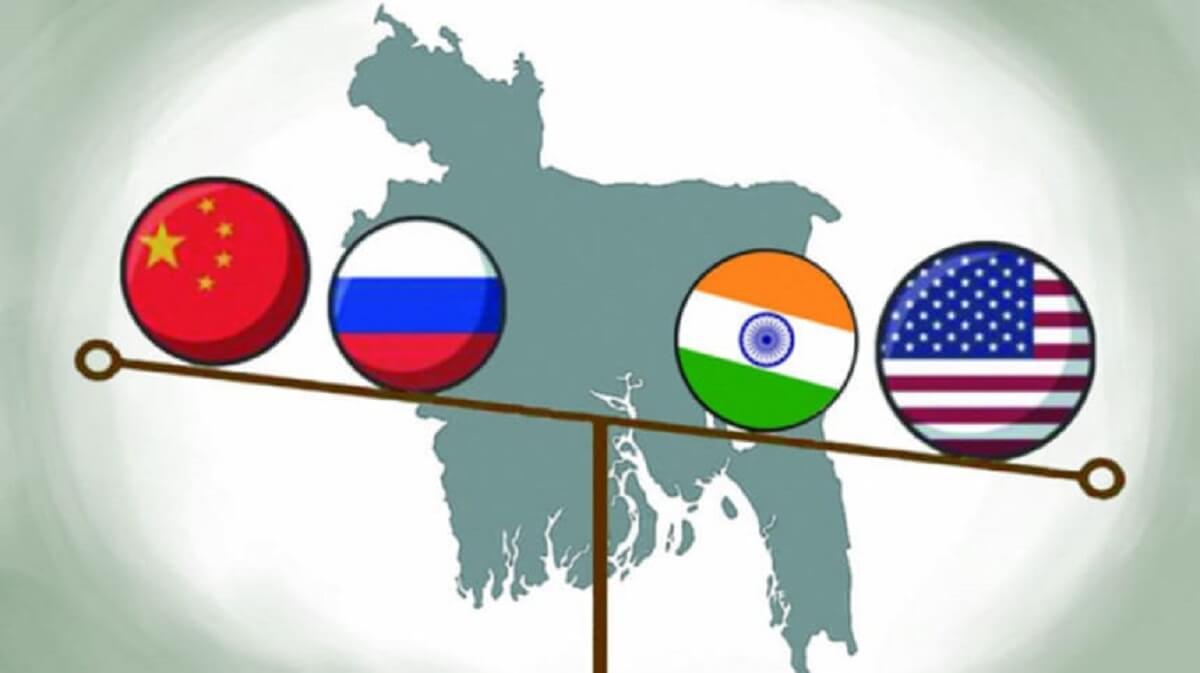Bangladesh's Foreign Policy Should Be Based on "National Interests"
Julian Rafah | 05 November 2024
"Friendship to all, malice towards none" is a well-known statement often cited in discussions on Bangladesh's foreign policy. However, in today's global landscape, maintaining equal friendship with all is impractical; diplomacy must instead be grounded in realism. Thus, foreign policy should be based on Bangladesh’s “national interests.” While small in size, Bangladesh has a large population, and its geostrategic significance is amplified by its location on the Bay of Bengal, bordered by India on three sides and Myanmar to the east. Bangladesh’s importance is acknowledged regionally and globally, especially as it has become a focal point in the United States' Indo-Pacific strategy.
In this evolving global context, Bangladesh’s foreign policy needs restructuring and updating to match current realities. The competition between China and India around the Bay of Bengal presents a potential threat to Bangladesh’s sovereignty. To address this, it is vital to modernise the armed forces, particularly the navy and air force. In terms of arms procurement, Bangladesh could engage with the United States, the United Kingdom, and other Western nations, while demand for Chinese equipment also exists. Diversifying sources of arms procurement, considering countries such as Turkey, Germany, and South Korea, is essential to avoid dependency on any single country.
Anu Anwar, a fellow at Harvard University’s John K. Fairbank Center for Chinese Studies, told The Business Standard that an independent, strong, stable, and democratic Bangladesh does not conflict with China’s interests. As long as Bangladesh does not enter a military alliance with the United States that threatens China’s security, China will not oppose the Bangladesh-U.S. relationship. For example, China and the United States have the largest trading relationship in the global economy. Washington does not view all countries solely through the lens of Sino-U.S. rivalry, and Bangladesh is not seen from that perspective. The U.S. recognises China’s significance for Bangladesh’s development. Additionally, if Bangladesh seeks U.S. cooperation in strengthening democratic institutions, rebuilding, and economic development, it is unlikely to encounter objections from China.
Therefore, Bangladesh’s foreign policy should be crafted to ensure that both India and China view Bangladesh as valuable, while avoiding a tilt toward either, which would conflict with its national interests. Strengthening relations with the U.S. is crucial to achieving this balance. Moreover, improving the investment climate is necessary to attract more foreign investment, especially from the U.S. and China. Bangladesh’s foreign policy must remain dynamic and adaptable, with “national interests” at its core.
Bangladesh should adopt a pragmatic foreign policy approach, focusing on developing skilled researchers, foreign policy analysts, and diplomats. The Bangladesh embassy in the U.S. has the responsibility of uniting expatriate Bangladeshis and American citizens of Bangladeshi origin to leverage their influence for national interests. For instance, a Bangladeshi-American should ideally head the U.S.-Bangladesh Business Council, not an individual from another nationality. Furthermore, fostering experts in international relations, law, and politics who can positively represent Bangladesh in Washington would draw greater U.S. attention to Bangladesh, increasing its regional influence and attracting global investment and cooperation.
Given Bangladesh's strategic position, it acts as a bridge between South Asia and Southeast Asia. Regional and sub-regional organisations like ASEAN and SAARC are vital for Bangladesh. Revitalising SAARC and pursuing ASEAN membership, i.e., adopting a “Look East” foreign policy, aligns with Bangladesh's national interests. Despite being among the fastest-growing economies globally, South Asian nations lack developed interconnectivity in road and rail networks. The more Bangladesh engages in multilateral regional and global economic coalitions and initiatives, the more it can assert itself as an independent, sovereign state with “strategic autonomy.” Such alliances can also help Bangladesh tackle issues that align with its national interests, such as the Rohingya crisis, climate change, and international crimes like drug trafficking, terrorism, and human trafficking. Bangladesh can benefit from joining initiatives and alliances like the Indo-Pacific Economic Framework (IPEF), BRICS, and the Shanghai Cooperation Organisation.
The success of Bangladesh’s foreign policy ultimately depends on public support. If foreign policy formulation and diplomacy involve public participation and reflect the people’s will, no global superpower will be able to intimidate Bangladesh. Internal political stability, which hinges on uniting the populace, can only be ensured through free and fair elections that genuinely represent the people’s choice. Agreements with foreign countries should be debated in parliament and subject to transparency. Ensuring accountability and transparency in foreign agreements will safeguard the nation’s interests. Bangladesh must formulate a foreign policy that is modern, dynamic, diverse, and adaptable, upholding national independence, sovereignty, and integrity. This policy should allow flexibility to adapt to changing circumstances, prioritising core “national interests” and maintaining strategic autonomy.
Julian Rafah is a LL.M. Candidate at the University of Dhaka and an official contributor to The Daily Star’s Law & Our Rights. He is interested in geopolitics, security, and global affairs.
Views in this article are author’s own and do not necessarily reflect CGS policy.
Comments
-
17 Nov 2024, 10:46 PM
"Interest" is a vague word. The policy interest may reflect the interest of some stakeholders while ignoring others. National Interest should not be a determinant. Because a country long term and short term interest may differ with the time and demography. As a petty country (in size and power) "Peace" is the only way. We cannot have a luxury of belligerent or Nuke loving. We are not intimidated by intrusive threat rather the Hegemony of neighbouring nuclear power country is persistent in our foreign guidelines and MoUs. To change and formulate divergent foreign policy we must acknowledge the diversified forces and people with their interest, otherwise national integrity is lost.
